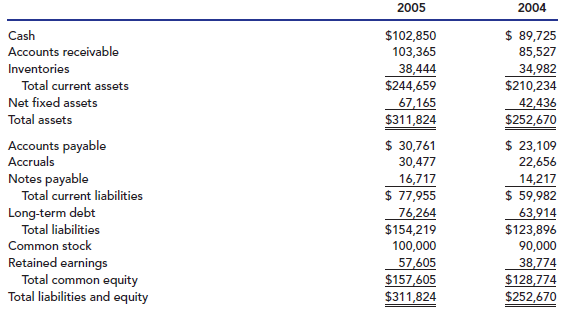Laiho Industries 2004 and 2005 balance sheets (in thousands of dollars) are shown below: a. Sales for
Question:
Laiho Industries’ 2004 and 2005 balance sheets (in thousands of dollars) are shown below:

a. Sales for 2005 were $455,150,000, and EBITDA was 15 percent of sales. Furthermore, depreciation was 11 percent of net fixed assets, interest was $8,575,000, the corporate tax rate was 40 percent, and Laiho pays 40 percent of its net income out in dividends. The firm has no amortization expense. Given this information, construct the 2005 income statement.
b. Construct the statement of retained earnings for the year ending December 31, 2005, and the 2005 statement of cash flows.
c. Calculate net working capital and net operating working capital. What are the differences in these two measures?
d. Calculate total operating capital, NOPAT, operating cash flow, and free cash flow for 2005.
e. Calculate the 2005 MVA. There were 10 million shares outstanding and the year-end closing price was $17.25 per share.
f. If Laiho increased its dividend payout ratio, what effect would this have on its corporate taxes paid? What effect would this have on the taxes paid by the company’s shareholders?
DividendA dividend is a distribution of a portion of company’s earnings, decided and managed by the company’s board of directors, and paid to the shareholders. Dividends are given on the shares. It is a token reward paid to the shareholders for their... Free Cash Flow
Free cash flow (FCF) represents the cash a company generates after accounting for cash outflows to support operations and maintain its capital assets. Unlike earnings or net income, free cash flow is a measure of profitability that excludes the...
Step by Step Answer:

Fundamentals of Financial Management
ISBN: 978-0324302691
11th edition
Authors: Eugene F. Brigham, Joel F. Houston





